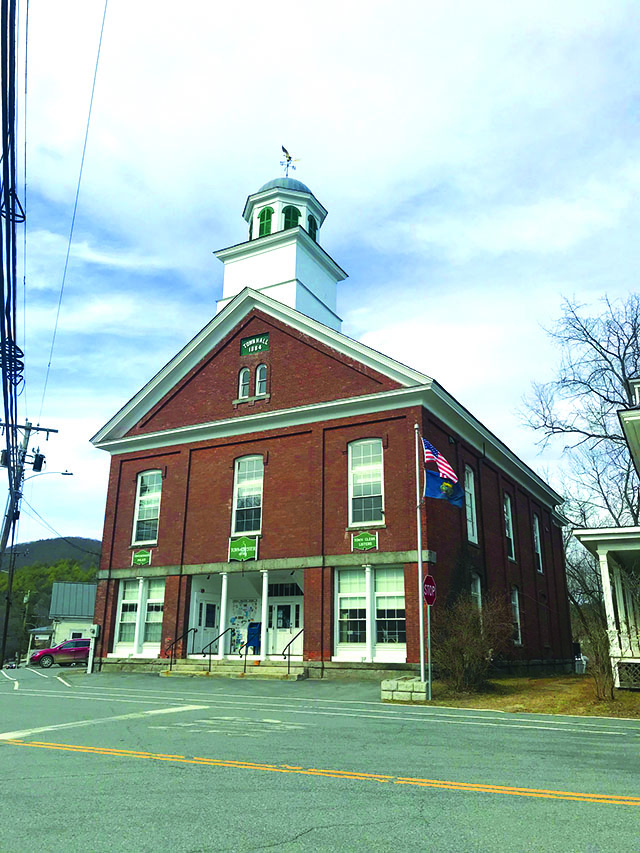
CHESTER, Vt. – The Chester Selectboard began their Wednesday, Nov. 20, meeting by hearing updates from town manager Julie Hance, who told the board that the town had been awarded a Municipal Energy Resilience Program (MERP) grant totaling nearly $500,000. The grant, Hance said, will be used to upgrade the energy infrastructure of municipal buildings, including the town hall, Whiting Library, and Chester Academy building.
The board then moved to approve use of a short list of town roads by the Chester Snowmobile Club. During the discussion, Chester landowner Paul Bidgood rose to address the board, asking if the list of roads included in the selectboard’s packet was the “complete list of roads that the snowmobile club can use?” Bidgood was informed by board member Peter Hudkins that, in the State of Vermont, “any unplowed road” is automatically allowed for snowmobile use.
Bidgood has been engaged in a longstanding struggle with the towns of Chester and Cavendish to prevent snowmobile use of a portion of Bailey Hill Road, also known as Town Highway 136, which runs through his property, and which he says is actually private property that has been improperly classified as a Class 4 road. Reading from a lengthy statement, Bidgood reiterated his claim that a section of the road in question was “discontinued” in 1905, and another section was similarly discontinued in 1932. However, according to Bidgood, at a meeting of the Cavendish Selectboard on March 21, 1997 – “that fateful day,” as Bidgood repeatedly referred to it – there was “collusion between the Town of Cavendish and the Town of Chester, for the benefit of VAST,” resulting in the road being classified as a town highway despite the previous discontinuances, which has resulted in use by the Vermont Association of Snow Travelers (VAST) each winter up to the present day.
The selectboard informed Bidgood that they had been working on the matter with the town’s attorney Jim Carroll since he had initially brought the issue to them in February, and would be issuing a decision in the coming weeks. “There is a lot more to this than just the presentation that you gave us. There’s documents stacked this high,” responded Board Chair Arne Jonynas, indicating a stack nearly a foot high.
Bidgood, in his final words to the board, explained, “I do not want to get accosted or arrested when I stop snowmobiles from coming from Chester’s side into Cavendish. The Chester road only goes as far as the town line,” addressing the latter part of his comments to members of the Chester Snowmobile Club in attendance at the meeting. Jonynas shrugged and brought an end to the discussion, noting that the road Bidgood was speaking about was not included on the list of roads currently being approved, and that therefore, by the rules of order governing the meeting, this was not the proper time for discussion of the issue.
The board also heard from Joe Karl of the Chester Housing Commission, who wanted the board to seek approval from the voters of Chester at March’s Town Meeting to set up what he called a “housing trust fund.” This fund would be controlled by the housing commission, and would be used to “assist in funding projects…without going to the tax base,” Karl stated. The fund would provide capital subsidy for housing developments, accessory dwelling unit creation, use of publicly owned land for housing, bringing vacant lots into code compliance, and permitting for housing projects, according to Karl, and could be funded in a number of ways. One of the funding methods discussed at the meeting was a 1% local options tax, which would also require voter approval. However, this was not pursued concretely, and the board intended to revisit the issue if and when the voters approve the housing trust fund.
The board also looked over draft budgets for the Whiting Library and the Chester recreation and facilities departments. Of particular note, the Whiting Library was requesting that Chester cover all personnel expenses, at a total of $125,356. The library, treasurer Lora Cokolat told the board, has in the past struggled to retain personnel due to low wages. While the library is now providing competitive wages to its employees, this has required a commensurate increase in their budget for the last several years, though the payroll budget for 2025 is actually slightly lower than that for 2024. The full text of the draft budgets can be seen in the selectboard’s Nov. 20 meeting packet at www.chestervt.gov/select-board.html.
Finally, Hance requested Economic Development Funds from the board, to aid in making electrical upgrades to the town hall auditorium, which has recently been used for an expanded array of events brought in by the volunteer group Upstairs at Town Hall. The project is intended to be done in two phases, with the first phase consisting of upgrades to the electrical panel on the balcony, and then installation of 16 electrical outlets total along both walls on the main floor. This phase is estimated to cost $17,000.
Phase 2 would be the installation of a panel box on the stage, and an upgrade to utilize three-phase power. This phase would cost $14,000, though Hance hoped that some could be offset with the MERP grant the town had received. While the board was generally supportive of this effort, some questioned whether three-phase power was feasible or necessary. Ultimately the board gave Hance the go-ahead to proceed with Phase 1, and will revisit plans and approval for Phase 2 in the future.
The Chester Selectboard’s next meeting will be held on Wednesday, Dec. 4, at 6:30 p.m., at the Chester Town Hall.